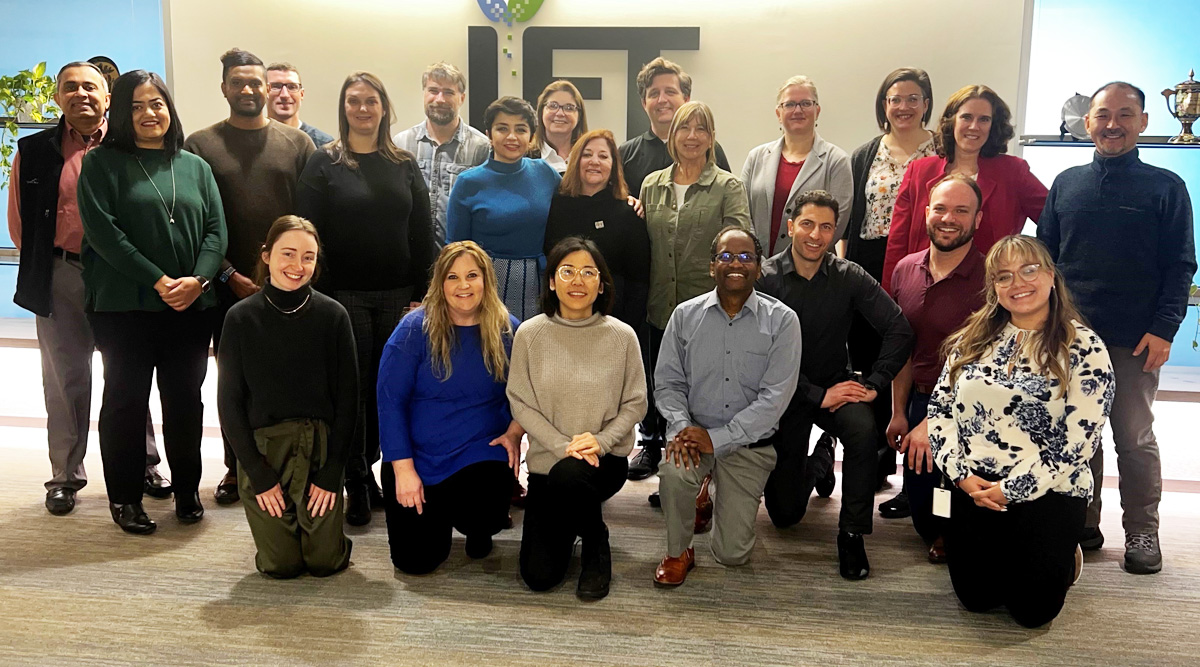
Inside IFT FIRST's Scientific Program
Learn about the behind-the-scenes work of 23 IFT volunteers who are a driving force behind the evolution of Science FIRST.

After IFT FIRST: Annual Event and Expo concludes each July—and hardly a beat after the dust has settled on the expo floor—a dedicated group of IFT member volunteers known as the Annual Meeting Scientific Program Advisory Panel, or AMSPAP, gets to work planning the next year’s scientific program.
“We think of the annual meeting as the big finish, but it’s also a beginning,” says Michelle Braun, who currently serves as AMSPAP’s chair. “The meeting catalyzes so many conversations—what was good, what we could do differently—and it’s those conversations that inform Science FIRST programming for the following year.”
As IFT FIRST wraps up, a monthslong and distinctly member-driven process commences. It starts with crowdsourcing. “We ask [our members], ‘What are the questions we need to ask ourselves and answer to better advance the science of food?’” says Braun. “Anyone can submit a question—board members, first-time attendees, students. We must have good questions to find the answers; that’s foundational to research.”
Those questions fall into the capable hands of AMSPAP’s 23 subject matter experts who represent a wide variety of disciplines, such as food safety, health and nutrition, sensory, microbiology, engineering, and chemistry, as well as sectors within the profession from academia and fundamental research to product development, sales and marketing, manufacturing, and startups. As IFT members, they are also highly attuned to IFT FIRST’s attendee audience and the wide-ranging interest areas and professional roles it represents.
These experts, who commit to a two-year volunteer term, then work with IFT staff to harness member-driven input, organizing the submitted questions into clusters that eventually become the overarching “guiding questions” shared as part of the call for proposals in the fall. The work unfolds in several virtual meetings held from October through December and culminates at an intensive, in-person winter meeting at IFT’s Chicago headquarters.
During that winter meeting, submitted proposals are debated and discussed as AMSPAP members take on a monumental task: carefully crafting IFT FIRST’s 25 Scientific & Technical Forums. Each of these conversation-style panels feature four to five subject-matter experts with diverse backgrounds and expertise who strive to answer a single “guiding question,” or challenge, facing the food industry or profession. Each guiding question corresponds to one of five overarching “focus areas”: novel technology and innovation, sustainability and climate, health and nutrition, food safety, and consumer insights and education.
“The entire process is meant to tap into the knowledge of our community from the start, so that everything resonates with them,” says Jay Gilbert, director of scientific programs and career pathways at IFT who, with other IFT staff, works closely with AMSPAP members to usher the process along. “The AMSPAP process is structured to be extremely scientific. They provide so much intention behind how they select [each proposal] and why they put them together. They really connect the dots.”
Member engagement doesn’t stop there, however, says Braun. Those outside of AMSPAP, as well as IFT Divisions, are invited to share their expertise by serving as reviewers for session proposals. “It’s yet another opportunity for members to have a voice,” she adds.
It hasn’t always been this way. In the past, planning for the annual event’s scientific programming unfolded much like it does with traditional academic conferences where experts representing separate “tracks” curate proposals and organize panels focused on a scientific discipline rather than a unifying question or theme, says Nicolas Bordenave, who has been involved in AMSPAP for nearly a decade and currently serves on the panel representing IFT’s Board of Directors. “If there was overlap with other areas, great, but that was the exception,” he adds. “Now it’s totally different.”
Session formats have evolved, as well, shifting away from a symposium style of presentation where panelists lecture to a largely passive audience. Now, each of Science FIRST’s Scientific & Technical Forums are highly participatory featuring session “hosts” who encourage audience engagement and lively discussion.
Members shouldn’t feel like they need to possess specific skills to become a host, however. Bordenave says he received training from IFT in preparation for hosting a session last year that helped him foster greater interactivity between speakers and audience members, and those trainings continue this year.
Science FIRST continues to evolve in other ways, as well. This July, participants will notice that the scientific sessions are located nearer to the expo floor and other engaging and related destinations, like Fireside Chats and the Startup Pavilion, says Braun. “The sessions will take place just up the escalator from the expo floor,” she adds, “and there continue to be new and evolving formats to enable IFT FIRST attendance to be an immersive experience.”
The changes bring huge improvements to the IFT FIRST experience, Bordenave says, but they carry an even greater significance as well. “Bringing up the big questions that are important in the science of food helps attendees find answers when they attend IFT FIRST,” he says, “but the process also creates new questions and debates for the larger food community as a whole and shows the very specific leadership role that IFT plays.”
Learn more about this year’s Science FIRST program and register now to experience it for yourself. Interested in helping shape next year’s program? Contact IFT at [email protected] to find out how you can get involved or keep an eye out for the Call for Volunteers, which opens June 14.
